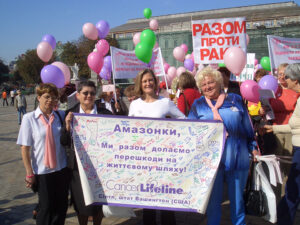Ukraine has a special place in my heart, in my career, and in my life. A Ukrainian breast cancer project first introduced me to the field of global oncology, along with experience of seeing first-hand the challenges (and rewards) of providing cancer care and conducting cancer research in a setting of constrained resources. From my […]
In last week’s issue of The Cancer Letter, I discussed potential nuclear dangers resulting from Russia’s invasion of Ukraine (The Cancer Letter, Feb. 25, 2022). Unfortunately, several events I predicted might happen have occurred.
It was awe-inspiring to see how quickly the world’s science came together to address the COVID-19 pandemic—and much was learned. Academic institutions, big pharma, government, and foundations stepped up to do everything possible in an unprecedented way. Two years later, the results are evident as life is returning to normal.
The images from Ukraine are beyond endurance. There is nothing to say about the ethics of this conflict. A fascist autocrat who leads a confederacy of kleptocrats decides to invade a neighboring state under a KGB-honed delusion that has been out of date since the 1990s so that his nation will be “stronger” by reattaching itself to a the blasted remains of a cultural treasure.
No modern war has been fought on the territory of a country with nuclear power facilities.
On behalf of the millions of Americans with cancer, whose very lives depend on our nation’s investment in oncology research, we ask that you join us now in urging congressional lawmakers to do the right thing: pass robust funding for the National Institutes of Health and the National Cancer Institute.
Racial and ethnic inequities are pervasive in clinical research—from the systemic factors that deter underrepresented populations from pursuing careers in science and medicine, to the discrimination, lack of support, and other hardships faced by those who do enter the biomedical profession.
Fifty years ago, the National Cancer Act was signed into law, providing the National Cancer Institute with new authority to expand discoveries in basic, clinical, and translational science, which included building a nationwide network of cancer centers to treat thousands of patients each day.
As we head into the third year of the global COVID-19 pandemic, everyone would just like it to be over.
The easiest way to respond to the ethics of doctors, nurses, and health care in the Third Reich is to dismiss what happened as the product of fringe practitioners getting permission from, or being forced by, fanatical ideological leaders to undertake manifestly bad science upon hated minorities.















